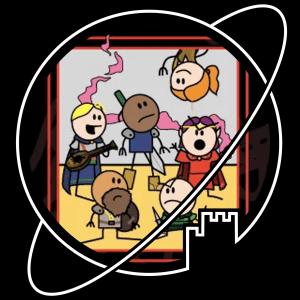- Novel written by S.A. Chakraborty
- Published in 7 March 2023
- Part one of a planned Amina al-Sirafi-trilogy


The Daevabad trilogy remains one of my all time favourite fantasy series, so you can imagine my excitement when I saw that a new Chakraborty had been released. Unfortunately I did not end up loving this one quite as much as the Daevabad trilogy, but the book still has much to recommend. I really liked that the protagonist was a bit older than the average fantasy protagonist. Because of this Amina’s internal struggles were refreshingly different: no annoying teenage angst, and the book was not driven by the romantic tension of some complicated and tortured love triangle. Instead, Amina’s thoughts were more focussed around the dilemma’s of leaving her child behind while providing for her family. A struggle many working parents will surely be able to relate to.
The book also does quite well on the representation front in general, and while a lot of the story was taken up by the ‘getting the old crew together’ build-up, it was fast-paced enough that it did not get boring. The plot itself was not spectacularly original, but I would say it served it’s purpose.
So overall I enjoyed the book, but it did not stand out to me like the Daevabad trilogy did. As always, it’s the characters that make or break the story for me, and while I liked them, I cannot say that I loved them. For example, three years after reading The Empire of Gold I am still able to vividly picture many of its side characters and to explain their complicated political motivations, while except for Amina herself, the crew-members in this book already seem to have blurred together in my mind.
Then again, there is definitely a lot of potential there, and with the Daevabad trilogy the first book was also by far my least favourite of the three. So when part two is released, count me in for sure!

Listened to the audiobook with Amin El Gamal and Lameece Issaq – well narrated.
Unlike most of our curators, I rather disliked Chakraborty’s City of Brass – it has been a while since I read it, but I mostly remember teenage drama taking all the life out of what could have otherwise been an interesting story in an original setting. I reread my review and I noted that Chakraborty’s style would perhaps be better suited to a more light-hearted tale (this is foreshadowing).
The Adventures of Amina al-Sirafi is not a more light-hearted tale. Quite the opposite, in fact: in Amina al-Sirafi, Chakraborty lost all the teenage drama and made her protagonist a retired pirate captain who is a mother first and foremost. I like that change of pace, and as a result, I think The Adventures of Amina al-Sirafi fit me a whole lot better. Whether Amina al-Sirafi also fits Chakraborty’s style better is another question altogether.
I’ve only read two of her books, so I should perhaps be careful to judge, but my impression is that Chakraborty tends to just keep it simple in her world building: less of a carefully constructed set of rules or a build up towards a certain end goal, more of a series of go-with-the-flow, rule-of-cool impressions.
The Adventures of Amina al-Sirafi is no different. None of the magical plot elements are ever really explained; they just exist and the reader is along for the ride. Especially towards the end of the book, a whole lot happens that raised my eyebrows a couple of times, but the reader is just expected to take it in stride.
I found this particularly frustrating because at the start of the novel, Chakraborty seems to be making an effort to ground her fantasy novel in the real world 12th century Middle-East, which initially had me hyped up – but it soon becomes apparent that she is liberally pasting staples of the fantasy genre over her historical setting.
The plot is written in a similar style. The first half of the book skirts the edge of cliché with how closely it follows the predictable tropes of ‘retired hero blackmailed into one last job’ and ‘getting the boys back together’. Chakraborty doesn’t execute these tropes poorly, but I feel this section of the book takes way more time to tell than it probably should have (especially considering that I still never really connected with the rest of the crew Amina is getting back together).
The second half of the novel is a highly-paced and action-packed flow that keeps your attention. Unfortunately, I felt the resolution of the plot isn’t particularly well-constructed and at times felt like it was written on the fly. It is best not to overthink it too much. Then again, I don’t think Chakraborty really encourages the reader to stop and think about it – that is not the kind of plot that she is writing.
It is, however, the kind of plot that I want to read. As a result, I lost my investment in the story towards the end of the novel and I might even have zoned out for some of the big end fights. I guess it is a sign on the wall.
Overall, I didn’t dislike The Adventures of Amina al-Sirafi, but I wouldn’t exactly recommend it to people like me either. I’ve been going back and forth on my star rating, and I probably would have given it 2.75 stars if that were a thing we did on this website. To me, it just falls narrowly short: lacking slightly in depth, lacking slightly in character; the plot in the first half is just a bit unoriginal, the resolution in the second half not quite earned – and the novel is still over 16 hours of listening.
Bluntly put, The Adventures of Amina al-Sirafi is just too long, just slightly too ambitious for what it offers. If this would have been a quick and simple 8-hour read that I would have blazed through in a week, I would have likely rated it a whole lot higher.
As a result, I remain convinced that Chakraborty’s style is just a little ‘light’ for the kind of novels she is writing. I’m not sure I’ll pick up another of her books, but I might be interested if she veered off into a more intentionally simple and humorous direction, where I feel her original ideas might come into their own a lot better.













